小学英语香港朗文版 5B 知识集锦
文档属性
| 名称 | 小学英语香港朗文版 5B 知识集锦 | 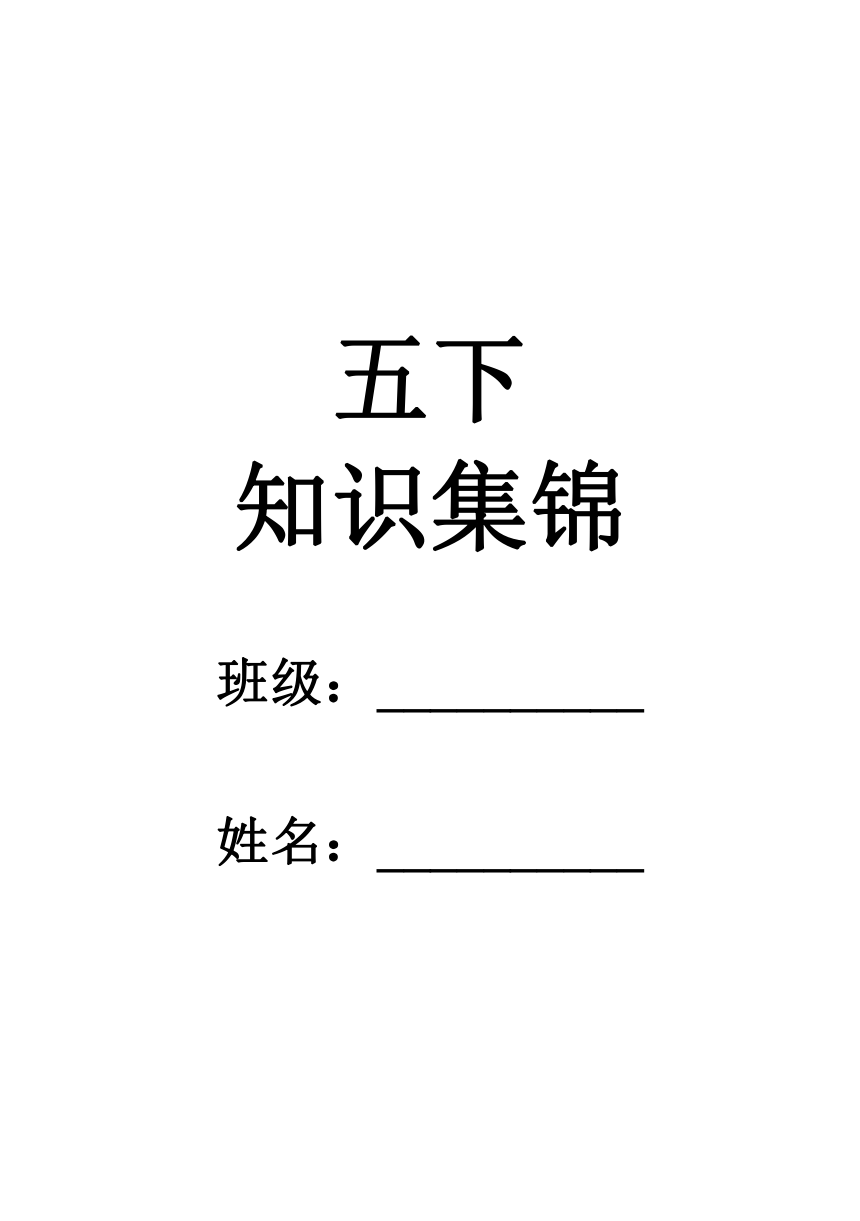 | |
| 格式 | docx | ||
| 文件大小 | 740.6KB | ||
| 资源类型 | 教案 | ||
| 版本资源 | 香港朗文版 | ||
| 科目 | 英语 | ||
| 更新时间 | 2025-02-20 20:14:46 | ||
图片预览

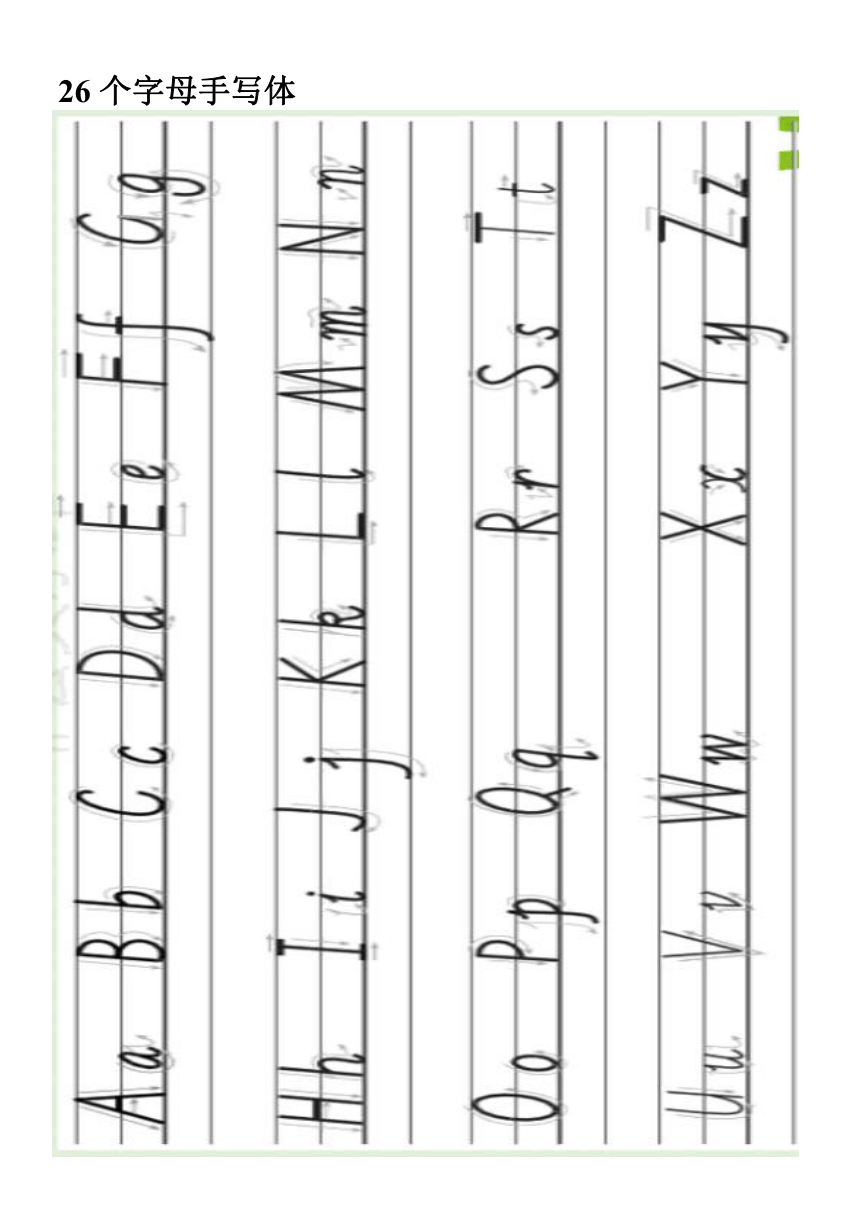
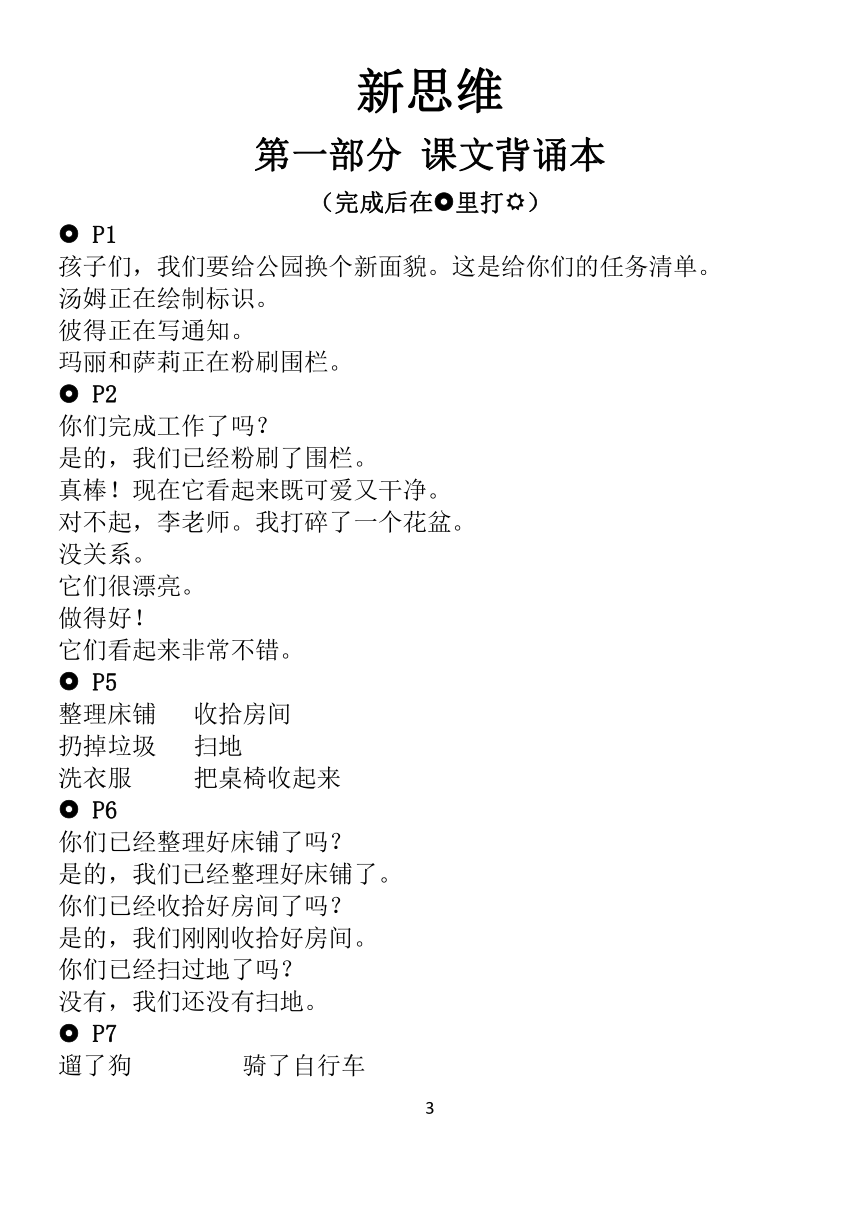
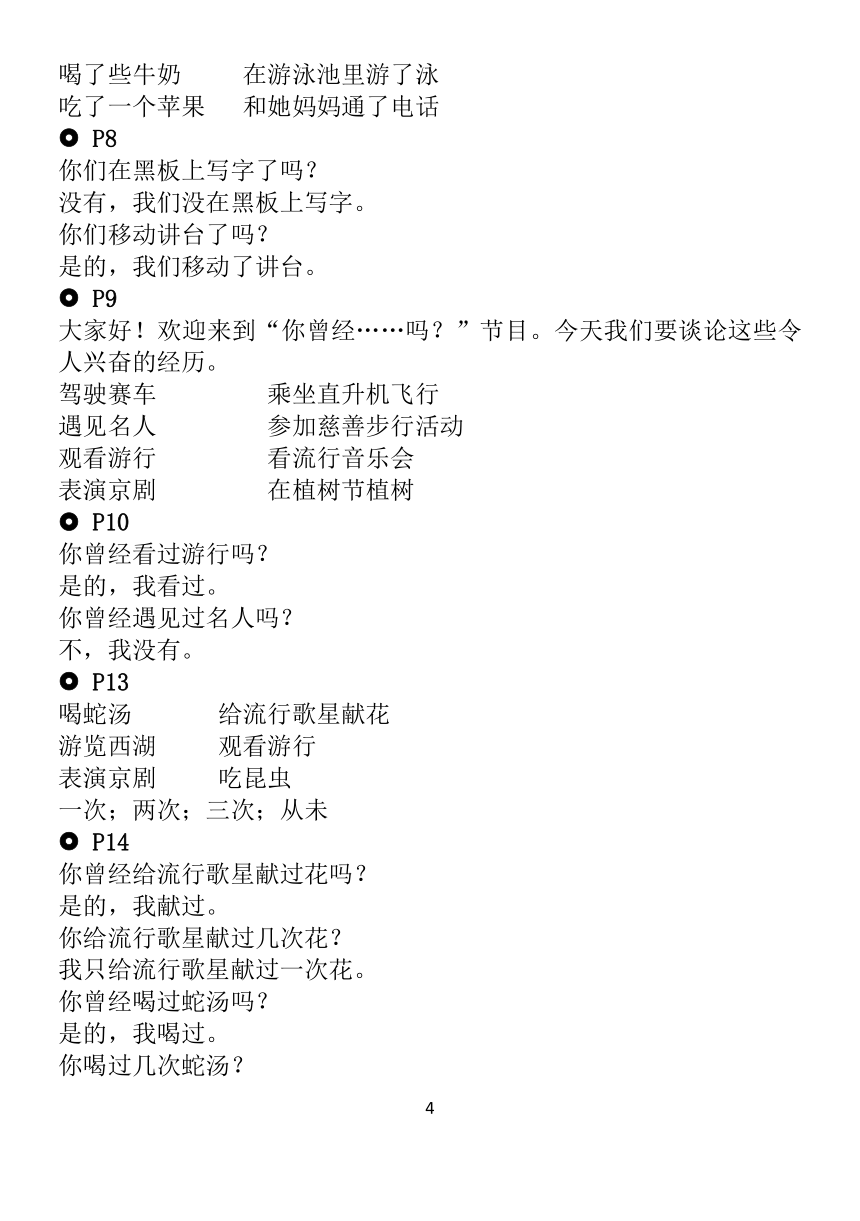
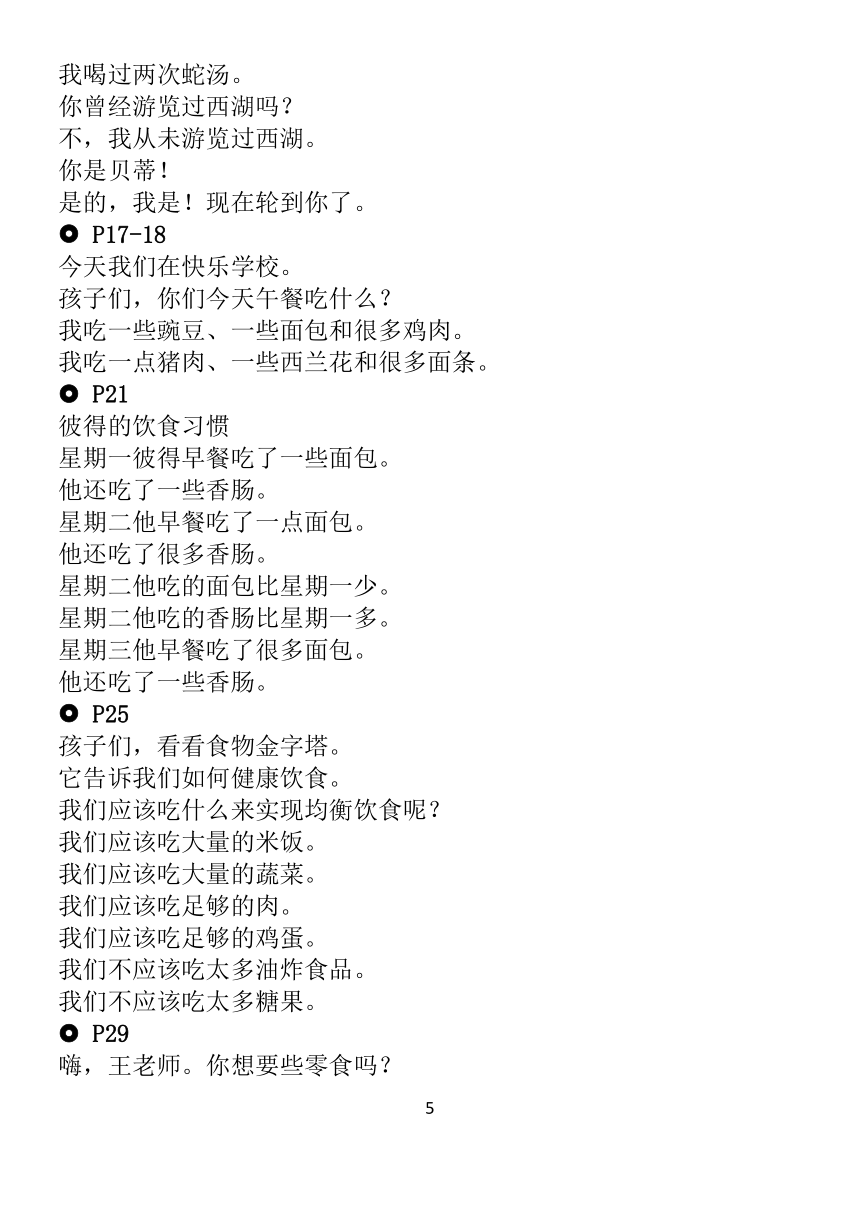
文档简介
五下
知识集锦
班级:__________
姓名:__________
26个字母手写体
新思维
第一部分 课文背诵本
(完成后在里打)
P1
孩子们,我们要给公园换个新面貌。这是给你们的任务清单。
汤姆正在绘制标识。
彼得正在写通知。
玛丽和萨莉正在粉刷围栏。
P2
你们完成工作了吗?
是的,我们已经粉刷了围栏。
真棒!现在它看起来既可爱又干净。
对不起,李老师。我打碎了一个花盆。
没关系。
它们很漂亮。
做得好!
它们看起来非常不错。
P5
整理床铺 收拾房间
扔掉垃圾 扫地
洗衣服 把桌椅收起来
P6
你们已经整理好床铺了吗?
是的,我们已经整理好床铺了。
你们已经收拾好房间了吗?
是的,我们刚刚收拾好房间。
你们已经扫过地了吗?
没有,我们还没有扫地。
P7
遛了狗 骑了自行车
喝了些牛奶 在游泳池里游了泳
吃了一个苹果 和她妈妈通了电话
P8
你们在黑板上写字了吗?
没有,我们没在黑板上写字。
你们移动讲台了吗?
是的,我们移动了讲台。
P9
大家好!欢迎来到“你曾经……吗?”节目。今天我们要谈论这些令人兴奋的经历。
驾驶赛车 乘坐直升机飞行
遇见名人 参加慈善步行活动
观看游行 看流行音乐会
表演京剧 在植树节植树
P10
你曾经看过游行吗?
是的,我看过。
你曾经遇见过名人吗?
不,我没有。
P13
喝蛇汤 给流行歌星献花
游览西湖 观看游行
表演京剧 吃昆虫
一次;两次;三次;从未
P14
你曾经给流行歌星献过花吗?
是的,我献过。
你给流行歌星献过几次花?
我只给流行歌星献过一次花。
你曾经喝过蛇汤吗?
是的,我喝过。
你喝过几次蛇汤?
我喝过两次蛇汤。
你曾经游览过西湖吗?
不,我从未游览过西湖。
你是贝蒂!
是的,我是!现在轮到你了。
P17-18
今天我们在快乐学校。
孩子们,你们今天午餐吃什么?
我吃一些豌豆、一些面包和很多鸡肉。
我吃一点猪肉、一些西兰花和很多面条。
P21
彼得的饮食习惯
星期一彼得早餐吃了一些面包。
他还吃了一些香肠。
星期二他早餐吃了一点面包。
他还吃了很多香肠。
星期二他吃的面包比星期一少。
星期二他吃的香肠比星期一多。
星期三他早餐吃了很多面包。
他还吃了一些香肠。
P25
孩子们,看看食物金字塔。
它告诉我们如何健康饮食。
我们应该吃什么来实现均衡饮食呢?
我们应该吃大量的米饭。
我们应该吃大量的蔬菜。
我们应该吃足够的肉。
我们应该吃足够的鸡蛋。
我们不应该吃太多油炸食品。
我们不应该吃太多糖果。
P29
嗨,王老师。你想要些零食吗?
我有一些饼干和一些酸奶。
不,谢谢你,萨莉。我不饿。你有健康的零食。
吃一些饼干和一些酸奶是可以的。
我的零食怎么样,王老师?
我有很多巧克力和薯片。
你不应该吃太多巧克力,查理。
你也不应该吃太多薯片。
P33
我们该去哪里
我们去青浦区吧。
我们在那里可以做什么?
我们可以在那里摘水果。我觉得摘水果很有趣。
P34
上海的户外活动
青浦区 / 摘水果
东滩国家湿地公园 / 观鸟
世纪公园 / 钓鱼
上海植物园 / 观赏植物和花卉
上海滨海森林公园 / 骑马
上海野生动物园 / 观赏野生动物
东佘山公园 / 观赏蝴蝶
西佘山公园 / 徒步旅行
P37
我们该去哪里?
我们去东滩国家湿地公园。
我们在那里可以做什么?
我们可以观赏鸟类。我觉得观赏鸟类是非常有趣的。
好主意。我们怎么从学校去东滩国家湿地公园?
我们可以乘坐校车去那里。
到那里要花多长时间?
大约需要花费一个小时十分钟。
它离学校有多远?
它离学校6千米远。
P39
我们在入口处。首先我们可以步行去宝塔。
它离这里有多远?
它 1 公里。
步行到那里要花多长时间?
需要 30 分钟。然后我们可以走到农场。
我们将在两小时内回到入口。
P41
几乎所有种类的海龟都濒临灭绝。
海龟没有牙齿!它们只是简单地吞下食物。
它们必须时不时地浮出水面呼吸。
海龟可以在水下待一段时间。
每只母海龟可以产下一百多个蛋!
只有一两只幼龟能存活到成年。
海龟有坚硬的外壳来保护它们的身体。
外壳不能保护它们的头部或腿部!
虽然海龟可以在水下待一段时间,但它们必须时不时地浮出水面呼吸。
P42
亚洲象信息:
亚洲象:如今世界上的亚洲象不到5万头。
亚洲象喜欢群居。
即使长大后,它们也和家人待在一起。
亚洲象非常强壮。
人们用它们来搬运重物。
亚洲象非常重。
它们是非常出色的游泳者。
人们为了获取象牙而猎杀亚洲象。
剩下的亚洲象不多了。
人们为了获取象牙而猎杀亚洲象。因此,剩下的亚洲象不多了。
P45
我们去上海野生动物园看熊猫吧。
好主意!首先我们得到达野生动物园地铁站。
我们怎么从野生动物园地铁站到达那里?
我们可以走路到那里。
它离野生动物园地铁站有多远?
2千米。
多长时间才能到那?
25分钟。
第二部分 单词表P57-61
第一章
1. draw a sign [dr (r) sa n] 画一个标志
2. write a notice [ra t n t s] 写一则通知
3. paint a fence [pe nt fens] 粉刷围栏
4. break a flowerpot [bre k fla (r) p t] 打碎一个花盆
5. make the bed [me k bed] 整理床铺
6. tidy the room [ ta di ru:m] 整理房间
7. throw away the rubbish [θr we r b ] 扔掉垃圾
8. sweep the floor [swi:p fl :(r)] 扫地
9. do the washing [du: w ] 洗衣服
put the table and chairs away [p t te bl nd t e z we ] 把桌椅收起来
第二章
11. drive a racing car [dra v re s kɑ:(r)] 驾驶赛车
12. fly in a helicopter [fla n hel k pt (r)] 乘坐直升机飞行
13.meet a famous person/mi:t fe m s p :sn/遇见一位名人
14.participate in a charity walk/pɑ: t s pe t n t r ti w :k/参加慈善步行活动
15.watch a parade/w t p re d/ 观看游行
16.see a pop concert/si: p p k ns t/看一场流行音乐会
17.perform in a Beijing opera/p f :m n be d pr /在京剧里表演
18.plant trees on National Tree-planting Day/plɑ:nt tri:z n n n l tri: plɑ:nt de / 在植树节植树
19.have snake soup/h v sne k su:p/ 喝蛇汤
20.give flowers to a pop star/ɡ v fla z tu: p p stɑ:(r)/给一位流行明星送花
21.visit West Lake [ v z t west le k] 游览西湖
22. eat insects [i:t nsekts] 吃昆虫
第三章
23. chicken [ t k n] 鸡肉
24.pork [p :k] 猪肉
25.beef [bi:f] 牛肉
26. sausages [ s s d z] 香肠
27. duck [d k] 鸭肉
28. peas [pi:z] 豌豆
29. broccoli [ br k li] 西兰花
30. lettuce [ let s] 生菜
31. grapes [ɡre ps] 葡萄
32. a fruit tart [ fru:t tɑ:t] 一个水果馅饼
33. ice cream [ a s kri:m] 冰淇淋
34. apple juice [ pl d u:s] 苹果汁
35. milk [m lk] 牛奶
36. tea [ti:] 茶
37. fish [f ] 鱼
38. bread [bred] 面包
39. spaghetti [sp ɡeti] 意大利面条
40. noodles [ nu:dlz] 面条
41. rice [ra s] 米饭
42. a chicken wing [ t k n w ] 一个鸡翅
43. dim sum [ d m s m] 点心
44. a hot dog [ h t d ɡ] 一个热狗
第四章
45. sweet corn [swi:t k n] 甜玉米
46. yoghurt [ j ɡ t] 酸奶
47. crackers [ kr k z] 薄脆饼干
48. potato chips [p te t t ps] 薯片
49. chocolate [ t kl t] 巧克力
50. cookies [ k kiz] 饼干
51. a steamed bun [ sti:md b n] 一个馒头
52. butter [ b t (r)] 黄油
53. salad dressing [ s l d dres ] 沙拉酱
第五章
54. pick fruit [p k fru:t] 采摘水果
55. watch birds [w t b :dz] 观鸟
56. go fishing [ɡ f ] 去钓鱼
57. look at plants and flowers [l k t plɑ:nts nd fla z] 观赏植物和花卉
58. go horse - riding [ɡ h :s ra d ] 去骑马
59. watch wild animals [w t wa ld n mlz] 观看野生动物
60. watch butterflies [w t b t fla z] 观赏蝴蝶
61. go hiking [ɡ ha k ] 去徒步旅行
第六章
62. a sea turtle [ si: t :tl] 一只海龟
63. an Asian elephant [ n e n el f nt] 一头亚洲象
64. a water bird [ w :t (r) b :d] 一只水鸟
65. an orang - utan [ n :r u:t n] 一只猩猩
66. a Chinese white dolphin [ t a ni:z wa t d lf n] 一只中华白海豚
第七章
67. shocked [ kt] 震惊的
68. tired [ ta d] 疲倦的
69. frightened [ fra tnd] 害怕的
70. surprised [s pra zd] 惊讶的
第三部分 动词P62-67
二、音素
48音素: 元音音素20个 辅音音素28个
1.大叫一声 /ɑ:/ 21.婆婆泼水 /p/
2.尖角扎人 / / 22.手剥香蕉 /b/
3.恍然大悟 / :/ 23.两指弹起 /t/
4.半边圆圈 / / 24.小马跑步 /d/
5.三天没吃 / / 25.轻轻咳嗽 /k/
6.小鹅倒立 / / 26.农夫割草 /g/
7.织件毛衣 /i:/ 27.轻轻抚摸 /f/
8.喊句口号 /I/ 28.轻咬下唇 /v/
9.火车鸣笛 /u:/ 29.春蚕吐丝 /s/
10.污污水坑 / / 30.电钻打洞 /z/
11.三指咧嘴 / / 31.轻咬舌尖 /θ/
12.一指微笑 /e/ 32.舌尖发麻 / /
13.应答一声 /e / 33.一位老师 / /
14.爱的呼唤 /a / 34.日头高照 / /
15.熬夜男孩 / / 35.大口喝水 /h/
16.一只小鹅 / / 36.大口吃饭 /t /
17.挨饿小鹅 /e / 37.蜘蛛织网 /d /
18.五只小鹅 / / 38.轻轻戳动 /tr/
19.疯狂呕吐 / / 39.小鸟捉虫 /dr/
20.老虎咆哮 /a / 40.呲牙咧嘴 /ts/
41.工人伐木 /dz/
元音字母 42.嘴巴紧闭 /m/
Aa Ee Ii Oo Uu 43.嘴巴微张 /n/
拼音规则 44.舌头拱起 / /
元+辅,各读各 45.气从旁流 /l/
辅+元,两者相拼 舌根后缩 /l/
辅+元+辅,先辅元,再顺延 46.卷起舌尖 /r/
多元多辅,先找元,再辅元,再相连,重音符号是关键 47.一位爷爷 /j/
几个元音几个音节,先划音节再拼读 48.学生是我 /w/
三、句子问答&口诀
1.be动词:am, is, are.是是是;单数is,复数are; is跟着he,she,it.
I am是一家;You are不分家。
Be动词过去式:单数was,复数were
2.have,has有有有;have复数,has单。I have,You have大家有。
3.his他的,her她的,its它的,my我的,
your你(们)的,their他们的,后面一定有名词。
4.who谁, whose谁的,what什么,where哪里,when什么时候,
what colour什么颜色,how怎样,how old问几岁, how much多少钱
how many问多少,How/What about怎么样 what time 问几点
What’s the weather like?问天气 Why问Because答.
What’s sb. (某人)like?某人怎么样?-Sb. is clever. 某人很聪明。
What can sb. (某人)do?某人能做什么?-Sb. can write. 某人能写字。
What would sb. (某人) like 某人想要什么?-Sb. would like...某人想要...
*where where在哪里,回答方位介词和地点
(in/on/under/near/in front of/behind/over there.....)
5.Would you like来提问,Yes,please.\No,thanks.来回答。
6.可数名词=1,辅用a,元用an,>1用复数,记得加s.
7.单数this/that用is 复数these/those要用are
this这个/these这些离我近 that那个/those那些离我远
8.play球类没有the,play football/basketball
play乐器要有the,play the piano / guitar / erhu
9. 情态动词 / be动词 / 助动词提前,一般疑问句。
(can/will/should) /(am/is/are) / (do/does//did)
Yes,No来回答,一肯定全肯定,一否定全否定。
10.Can I问,you can答: Yes, you can. / No, you can't.
Can you问, I can答:Yes,I can. / No, I can't.
Can he问,he can答: Yes, he can. / No, he can't.
Can she问, she can答:Yes,she can. / No, she can't.
Can they问,they can答: Yes, they can. / No, they can't.
11.Are you问, I am答:Yes, I am./No, I am not.
Are you问, We are答:Yes, we are./No, we are not.
Are they问, they are答:Yes, they are./No, they aren’t.
12.Is he问, he is答:Yes, he is./No, he isn’t.
Is she问, she is答:Yes, she is./No, she isn’t.
Is it问, it is答: Yes, it is. / No,it isn't.
13.Do you问, I do答:Yes,I do. / No, I don't.
Do they问, they do答:Yes,they do. / No,they don't.
14.Does he问, he does答:Yes, he does./No, he doesn’t.
Does she问, she does答:Yes, she does./No, she doesn’t.
15.What are you going to do 答:I’m going to play more sport.
16.What will you do 答:I will watch a film.
17.国家/地名/年份/季节/月要用in,
在上午/下午/晚上要用in,in the morning/afternoon/evening
某日/某日上下午要用on,on Monday morning在周一早上
在周末要用on,on the weekend
具体时刻用at,at 7o’clock在正午/午夜还用at,at noon/night
18.书写句子要注意:大写、间隔和标点。
(句子首字母要大写,单词与单词之间隔一个字母距离,标点符号不忘记。)
19.be good at+动词ing擅长做某事 enjoy+动词ing享受做某事
like/love+动词ing喜欢/爱做某事 be动词+动词ing正在做某事
20.情态动词can/could/will/shall/should+动词原形
want / need / like / love to+动词原形
21.There be就近原则:紧跟单数/不可数用is,紧跟复数用are
There is/There are “某地”有, “某地”存在
There is 有一个... There are 有多个...
There is a pair of +复数 有一双/一对...
There is a pair of shoes under the bed. 床下面有一双鞋。
22.Is there问,there is答:Yes, there is. /No,there isn't.
Are there问,there are答:Yes, there are./ No,there aren't.
23.和某人一起做某事用with 为某人做某事用for
24.问活动要用do,What do you do
问课程用have,What do you have
25.Let+宾格+do(原形) 让某人做某事
(宾格:me/us/you/it/him/her/them)
26.三个“也”有区别: too在肯定句末尾记得要加“,”;
either在否定句末尾也要加“,”;also用于肯定句中间。
27.频率副词,频率依次递减: always (总是) 、usually(通常)、
often (经常) 、sometimes(有时)、never(从不)
speak讲,加语言, speak English讲英语;
say说,加具体内容, say “Thank you!”说谢谢。
talk谈论:talk about谈论具体的内容;
talk to对着某人说;talk with和某人一起讨论
29.both两者都 ;all三个或三个以上都
30. lots of =a lot of 表许多,后跟可数名词复数或不可数名词,
a few表一些,后跟可数名词复数;
a little表一些,后跟不可数名词。
some用于肯定句,any用于否定和疑问。
若表请求或建议,some就把any替。
Can I have some pears?我可以吃一些梨吗? (请求)
Would you like some water?你想喝点水吗? (建议)
32.出现具体的时间点或单词如:now、look、listen
判断为现在进行时:be动词 +动词ing;
33.动词ing的变化规则:
◆直:直接+ing,如:drink—drinking fly--flying
◆去:不发音e结尾,去e+ing, 如:write—writing take--taking
◆双:重读闭音节结尾,双写词尾+ing, 如:run—running
◆改:ie结尾,改ie为y+ing, 如:lie-lying die-dying
34.动词过去式的规则变化
动词过去式规则一般加ed play-played
以e结尾的情况直接加上d like-liked
以辅音字母+y结尾,变y为i再加ed try-tried
若是重读闭音节结尾的时候,词尾辅音要双写 再加上ed
还有一些不规则变换,也需要你来单独记 stop-stopped
35.动词三单变化规则:
非你非我非复数(姓名/单数人称/单数名词),三单主语要会认
动词三单现在式,一般词尾加s, like-likes
词尾s,x还有o,动词后加es go-goes
ch,sh在词尾,也要加上es wash-washes
词尾辅+y,变y为i再加es fly-flies
特殊情况特殊记,be变is,have变has,还有do要变does
要是助理(助动词)有感情(情态动词),动词统统变原形。
36.名词变复数变化规则:
名词复数有规律,一般词尾加s cat-cats pen-pens
x s不规矩,词尾有它es bus -buses box-boxes
ch sh也有趣,后面也是es watch-watches dish-dishes
辅音字母加上y,把y变i,es baby-babies city -cities
f fe真小气,字母v来把它替,es在后别忘记
leaf -leaves knife-knives
字母o很神奇,有生命加es,没有生命加s
potato-potatoes tomato-tomatoes photo-photos
37.不规则变化:
sheep-sheep 绵羊 fish-fish鱼
child-children 孩子 mouse-mice 老鼠
man-men男人 woman-women女人 scarf-scarves / scarfs围巾
38.地点名词:
London伦敦Moscow莫斯科Singapore新加坡(市) Lhasa拉萨
Sydney悉尼New York 纽约Hong Kong香港 Harbin哈尔滨
39.人称代词和物主代词的用法: (主格是大哥,宾格动介后。)
主格 (作主语) I you she he it we you they
宾格 (介\动后) me you her him it us you them
我 你 她 他 它 我们 你们 他们
形物代 (后加名) my your her his its our your their
名物代 (后不加名) mine yours hers his its ours yours theirs
我的 你的; 她的 他的 它的 我们的 你们的 他/她/它们的
形物代是胆小鬼,出门要有名词陪。名物代是独行侠,一人独自闯天下。
40.缩写形式小结:(缩写符号是一', 扩充开来要注意。)
I'm=I am he's=he is she's=she is it's=it is
you're=you are we're=we are they're=they are
that's=that is here's=here is what's=what is
who's=who is where's=where is isn't=is not aren't=are not can't=can not don't=do not doesn't=does not I'd=I would Let's=Let us
41.动词go\play\have\do的不同搭配
go swimming go running go shopping go boating
play sports play ping-pong play the erhu play the piano
have …class have dinner have breakfast have lunch
do homework do kung fu do morning exercises
42.近义词短语:
eat breakfast—have breakfast eat lunch—have lunch
eat dinner—have dinner play sports—do sports
43.国家名对应国人:
Spain—Spanish America(USA/US)--American
China—Chinese England(UK)—English
Japan—Japanese Canada—Canadian
44.基数词和序数词的用法:
基数词(表示数量)+人数/个数/时间
three boys / days three / 3 o’clock
序数词(表示顺序)+日期/楼层 Apr. 4th the third floor
口诀:有the用序数词,几号用序数缩略词,其他都用基数词
45.基数词变序数词规则口诀:
1)基变序,有规律,结尾加上-th。
2)一、二、三,特殊记,结尾各是t,d,d。
3)八加h,九去e,f去把ve替。
4)y结尾变ie,结尾仍有th。
5)若是碰到几十几,前用基来后用序。
46.基数词变序数词规则
1.一般情况下,直接在后面加th.(1 , 2 , 3 除外) 如one—first ,
2.以ve结尾的基数词,变ve为f, 再加th 如:five—fifth
3.以t结尾的基数词,直接加h 如:eight—eighth.
4.以不发音的e结尾,去e,再加th 如:nine—ninth.
5.以y结尾的整十数,将y变为ie,再加th. 如twenty—twentieth
6.20以上的两位数,十位不变,只将个位变序数词。
如:twenty-one--—--twenty-first , thirty-four——thirty-fourth
7.序数词的简写形式:阿拉伯数字+该单词的最后两个字母。
如:first—1st , second—2nd , third—3rd , twentieth—20th
one two three four five
first second third fourth fifth
six seven eight nine ten
sixth seventh eighth ninth tenth
eleven twelve thirteen fourteen fifteen
eleventh twelfth thirteenth fourteenth fifteenth
sixteen seventeen eighteen nineteen twenty
sixteenth seventeenth eighteenth nineteenth twentieth
twenty-one twenty-two twenty-three twenty-four twenty-five
twenty-first twenty-second twenty-third twenty-fourth twenty-fifth
twenty-six twenty-seven twenty-eight twenty-nine thirty
twenty-sixth twenty-seventh twenty-eighth twenty-ninth thirtieth
四、人教五上知识整理
eat ( have ) breakfast / lunch / dinner 吃早饭/午饭/晚饭
after breakfast / school / class 早饭/放学/下课后
after 反 before (之前)
cook breakfast / lunch /dinner / rice
做早饭/午饭/晚饭/做饭
do morning exercises 做早操
do homework 做作业 do kung fu 练武术
have a Chinese class 上语文课
have an English / art class 上英语/美术课
take a dancing class 上舞蹈课
play the pipa for her 为她弹琵琶
play sports 进行体育运动 sports meet 运动会
go for a walk 散步 go on a picnic去野餐
go swimming / shopping / running / climbing
去游泳 / 购物 / 跑步 / 爬山
go加动词的ing形式 (表示去做某事)
clean my / his / her room 打扫我的/ 他的/ 她的房间
get up 起床 go to bed 上床睡觉
wash clothes 洗衣服 wash my face 洗脸
every day 每天 in Spain 在西班牙
on the weekend 在周末
on Saturday / Sunday 在星期六/星期日
at night 在晚上 last night 昨晚
at 9:30 or 10 o’clock 在9点半或10点
get up early / late 起床很早/很晚
(early早的 反 late晚的)
in spring / summer / autumn ( fall ) / winter
在春天/夏天/秋天/冬天
make a snowman 堆雪人 play in the snow在雪地里玩
plant flowers 种花 eat ice cream 吃冰激凌
sunny晴朗的 rainy多雨的 windy有风的
cloudy 多云的 snowy下雪的
hot热的/辣的--cold冷的 warm暖和的--cool 凉爽的
like best最喜欢 (相当于favourite)
like spring best 最喜欢春天
this year 今年 last year 去年 next year 明年
in January /Aug. 在一月/ 八月
by March 23rd 在3月23日之前
Happy birthday! 生日快乐!(答Thank you! / Thanks!谢谢!)
write her a letter 写信给她 tell her a story 给她讲故事
sing the birthday song唱生日歌 singing contest 唱歌比赛
sing to her 唱歌给她听 say “Thank you” 说“谢谢”
eat noodles吃面条 eat a birthday cake吃生日蛋糕
make a card 做张卡片 make a wish 许愿
at the pary 在聚会上 school trip 学校旅行
a few fun things一些有趣的事情
(a few + 可数名词复数: a few apples)
some + 可数名词复数 / 不可数名词: some books / milk
a lot of=lots of(很多)+可数名词复数/不可数名词:
a lot of books / milk
my / his / her birthday我/他/她的生日
my mother’s birthday我母亲的生日
go to the Great Wall 去长城 go home 回家
go to work 去上班
art show 艺术节 reading festival 读书节
Chinese / English test 语文/英语考试
eat mooncakes 吃月饼
look at 看 six days old 6天大
of course =sure=OK 当然可以 special day 特殊的日子
both of you 你们两个 make noises 发出响声
cook noodles 煮面条 the first day 第一天
April third 4月3日 Oct. 21st 10月21日
on April 5th 在 4月5日
at Chen Jie’s home 在陈洁的家里
at home 在家 at school 在学校里
take him to the park带他去公园 want to be a bird想变成一只鸟
Talk quietly! 小声讲话!
( Quiet, please.请安静点=Keep / Be quiet.保持安静。)
Work quietly! 安静地学习 Take turns. 按顺序来。
Keep your desk clean. 保持桌面整洁
Keep to the right. 靠右。
No eating. 不许吃东西。 right右 反 left 左
teach me/us English教我/我们英语 speak Chinese讲中文
That’s too late!那么晚呀!
That sounds like a lot of fun. 听起来好像很有趣。
You’re so busy!你真忙!
What else =Anything else 还有别的事吗?
Which season do you like best 你最喜欢哪个季节?
= What’s your favourite season 你最喜欢的季节是什么?
which season什么季节 which month 哪个月
Which season do you like best 你最喜欢哪个季节?
-Summer. / I like summer best. 夏天。/我最喜欢夏天。
-Which month do you like best 你最喜欢哪个月?
-June / I like June best. 六月。/我最喜欢六月。
Why do you like summer best 你为什么最喜欢夏天?
-Because I like summer vacation. 因为我喜欢暑假。
What about you = How about you 你呢?/你怎么样?
Merry Christmas! --Merry Christmas! 圣诞节快乐!
have a look 看一看
Do you see any elephants 你看到了大象吗?
Here they are. 它们在这儿。Here you are / Here it is.给你。
It’s playing with its mother. 它正在和它妈妈玩。(its mother它的妈妈)
show you / me / him / her 给你/我/他/她看
They like bamboo.它们喜欢竹子。
(bamboo表示数量和总称为不可数名词)
感叹句:名词what, 形副how
What a nice photo! 多么美的一张照片啊!
What pretty flowers they are!多漂亮的花啊!
How pretty the flowers are!这些花多漂亮啊!
How fast he runs!他跑得多快啊!
What will you do for your mum 你会为你妈妈做什么?
-I’ll cook noodles for her. 我会为她煮面条。
like 喜欢 (后接动词ing形式)
I like winter / apples / reading a book.
like 像...一样 I am dancing like a bear.
形容词性物主代词(后接名词):
This is my book. / These are her pens.
名词性物主代词(后不接名词):
This is mine. / These are hers.
名词所有格(名词+’s) Mike’s mother’s
s结尾+’ Mr Jones’ Teachers’ Day
名词所有格(后接名词或不接名词)
This is Mike’s book. =This is Mike’s.
对物主代词/名词所有格提问用whose:
-Whose are these
-They are my books / mine.
-Whose is it -It’s Zheng Peng’s
the picture of Beijing 这幅北京的画
(of表示所属关系,意为“…的”)
知识集锦
班级:__________
姓名:__________
26个字母手写体
新思维
第一部分 课文背诵本
(完成后在里打)
P1
孩子们,我们要给公园换个新面貌。这是给你们的任务清单。
汤姆正在绘制标识。
彼得正在写通知。
玛丽和萨莉正在粉刷围栏。
P2
你们完成工作了吗?
是的,我们已经粉刷了围栏。
真棒!现在它看起来既可爱又干净。
对不起,李老师。我打碎了一个花盆。
没关系。
它们很漂亮。
做得好!
它们看起来非常不错。
P5
整理床铺 收拾房间
扔掉垃圾 扫地
洗衣服 把桌椅收起来
P6
你们已经整理好床铺了吗?
是的,我们已经整理好床铺了。
你们已经收拾好房间了吗?
是的,我们刚刚收拾好房间。
你们已经扫过地了吗?
没有,我们还没有扫地。
P7
遛了狗 骑了自行车
喝了些牛奶 在游泳池里游了泳
吃了一个苹果 和她妈妈通了电话
P8
你们在黑板上写字了吗?
没有,我们没在黑板上写字。
你们移动讲台了吗?
是的,我们移动了讲台。
P9
大家好!欢迎来到“你曾经……吗?”节目。今天我们要谈论这些令人兴奋的经历。
驾驶赛车 乘坐直升机飞行
遇见名人 参加慈善步行活动
观看游行 看流行音乐会
表演京剧 在植树节植树
P10
你曾经看过游行吗?
是的,我看过。
你曾经遇见过名人吗?
不,我没有。
P13
喝蛇汤 给流行歌星献花
游览西湖 观看游行
表演京剧 吃昆虫
一次;两次;三次;从未
P14
你曾经给流行歌星献过花吗?
是的,我献过。
你给流行歌星献过几次花?
我只给流行歌星献过一次花。
你曾经喝过蛇汤吗?
是的,我喝过。
你喝过几次蛇汤?
我喝过两次蛇汤。
你曾经游览过西湖吗?
不,我从未游览过西湖。
你是贝蒂!
是的,我是!现在轮到你了。
P17-18
今天我们在快乐学校。
孩子们,你们今天午餐吃什么?
我吃一些豌豆、一些面包和很多鸡肉。
我吃一点猪肉、一些西兰花和很多面条。
P21
彼得的饮食习惯
星期一彼得早餐吃了一些面包。
他还吃了一些香肠。
星期二他早餐吃了一点面包。
他还吃了很多香肠。
星期二他吃的面包比星期一少。
星期二他吃的香肠比星期一多。
星期三他早餐吃了很多面包。
他还吃了一些香肠。
P25
孩子们,看看食物金字塔。
它告诉我们如何健康饮食。
我们应该吃什么来实现均衡饮食呢?
我们应该吃大量的米饭。
我们应该吃大量的蔬菜。
我们应该吃足够的肉。
我们应该吃足够的鸡蛋。
我们不应该吃太多油炸食品。
我们不应该吃太多糖果。
P29
嗨,王老师。你想要些零食吗?
我有一些饼干和一些酸奶。
不,谢谢你,萨莉。我不饿。你有健康的零食。
吃一些饼干和一些酸奶是可以的。
我的零食怎么样,王老师?
我有很多巧克力和薯片。
你不应该吃太多巧克力,查理。
你也不应该吃太多薯片。
P33
我们该去哪里
我们去青浦区吧。
我们在那里可以做什么?
我们可以在那里摘水果。我觉得摘水果很有趣。
P34
上海的户外活动
青浦区 / 摘水果
东滩国家湿地公园 / 观鸟
世纪公园 / 钓鱼
上海植物园 / 观赏植物和花卉
上海滨海森林公园 / 骑马
上海野生动物园 / 观赏野生动物
东佘山公园 / 观赏蝴蝶
西佘山公园 / 徒步旅行
P37
我们该去哪里?
我们去东滩国家湿地公园。
我们在那里可以做什么?
我们可以观赏鸟类。我觉得观赏鸟类是非常有趣的。
好主意。我们怎么从学校去东滩国家湿地公园?
我们可以乘坐校车去那里。
到那里要花多长时间?
大约需要花费一个小时十分钟。
它离学校有多远?
它离学校6千米远。
P39
我们在入口处。首先我们可以步行去宝塔。
它离这里有多远?
它 1 公里。
步行到那里要花多长时间?
需要 30 分钟。然后我们可以走到农场。
我们将在两小时内回到入口。
P41
几乎所有种类的海龟都濒临灭绝。
海龟没有牙齿!它们只是简单地吞下食物。
它们必须时不时地浮出水面呼吸。
海龟可以在水下待一段时间。
每只母海龟可以产下一百多个蛋!
只有一两只幼龟能存活到成年。
海龟有坚硬的外壳来保护它们的身体。
外壳不能保护它们的头部或腿部!
虽然海龟可以在水下待一段时间,但它们必须时不时地浮出水面呼吸。
P42
亚洲象信息:
亚洲象:如今世界上的亚洲象不到5万头。
亚洲象喜欢群居。
即使长大后,它们也和家人待在一起。
亚洲象非常强壮。
人们用它们来搬运重物。
亚洲象非常重。
它们是非常出色的游泳者。
人们为了获取象牙而猎杀亚洲象。
剩下的亚洲象不多了。
人们为了获取象牙而猎杀亚洲象。因此,剩下的亚洲象不多了。
P45
我们去上海野生动物园看熊猫吧。
好主意!首先我们得到达野生动物园地铁站。
我们怎么从野生动物园地铁站到达那里?
我们可以走路到那里。
它离野生动物园地铁站有多远?
2千米。
多长时间才能到那?
25分钟。
第二部分 单词表P57-61
第一章
1. draw a sign [dr (r) sa n] 画一个标志
2. write a notice [ra t n t s] 写一则通知
3. paint a fence [pe nt fens] 粉刷围栏
4. break a flowerpot [bre k fla (r) p t] 打碎一个花盆
5. make the bed [me k bed] 整理床铺
6. tidy the room [ ta di ru:m] 整理房间
7. throw away the rubbish [θr we r b ] 扔掉垃圾
8. sweep the floor [swi:p fl :(r)] 扫地
9. do the washing [du: w ] 洗衣服
put the table and chairs away [p t te bl nd t e z we ] 把桌椅收起来
第二章
11. drive a racing car [dra v re s kɑ:(r)] 驾驶赛车
12. fly in a helicopter [fla n hel k pt (r)] 乘坐直升机飞行
13.meet a famous person/mi:t fe m s p :sn/遇见一位名人
14.participate in a charity walk/pɑ: t s pe t n t r ti w :k/参加慈善步行活动
15.watch a parade/w t p re d/ 观看游行
16.see a pop concert/si: p p k ns t/看一场流行音乐会
17.perform in a Beijing opera/p f :m n be d pr /在京剧里表演
18.plant trees on National Tree-planting Day/plɑ:nt tri:z n n n l tri: plɑ:nt de / 在植树节植树
19.have snake soup/h v sne k su:p/ 喝蛇汤
20.give flowers to a pop star/ɡ v fla z tu: p p stɑ:(r)/给一位流行明星送花
21.visit West Lake [ v z t west le k] 游览西湖
22. eat insects [i:t nsekts] 吃昆虫
第三章
23. chicken [ t k n] 鸡肉
24.pork [p :k] 猪肉
25.beef [bi:f] 牛肉
26. sausages [ s s d z] 香肠
27. duck [d k] 鸭肉
28. peas [pi:z] 豌豆
29. broccoli [ br k li] 西兰花
30. lettuce [ let s] 生菜
31. grapes [ɡre ps] 葡萄
32. a fruit tart [ fru:t tɑ:t] 一个水果馅饼
33. ice cream [ a s kri:m] 冰淇淋
34. apple juice [ pl d u:s] 苹果汁
35. milk [m lk] 牛奶
36. tea [ti:] 茶
37. fish [f ] 鱼
38. bread [bred] 面包
39. spaghetti [sp ɡeti] 意大利面条
40. noodles [ nu:dlz] 面条
41. rice [ra s] 米饭
42. a chicken wing [ t k n w ] 一个鸡翅
43. dim sum [ d m s m] 点心
44. a hot dog [ h t d ɡ] 一个热狗
第四章
45. sweet corn [swi:t k n] 甜玉米
46. yoghurt [ j ɡ t] 酸奶
47. crackers [ kr k z] 薄脆饼干
48. potato chips [p te t t ps] 薯片
49. chocolate [ t kl t] 巧克力
50. cookies [ k kiz] 饼干
51. a steamed bun [ sti:md b n] 一个馒头
52. butter [ b t (r)] 黄油
53. salad dressing [ s l d dres ] 沙拉酱
第五章
54. pick fruit [p k fru:t] 采摘水果
55. watch birds [w t b :dz] 观鸟
56. go fishing [ɡ f ] 去钓鱼
57. look at plants and flowers [l k t plɑ:nts nd fla z] 观赏植物和花卉
58. go horse - riding [ɡ h :s ra d ] 去骑马
59. watch wild animals [w t wa ld n mlz] 观看野生动物
60. watch butterflies [w t b t fla z] 观赏蝴蝶
61. go hiking [ɡ ha k ] 去徒步旅行
第六章
62. a sea turtle [ si: t :tl] 一只海龟
63. an Asian elephant [ n e n el f nt] 一头亚洲象
64. a water bird [ w :t (r) b :d] 一只水鸟
65. an orang - utan [ n :r u:t n] 一只猩猩
66. a Chinese white dolphin [ t a ni:z wa t d lf n] 一只中华白海豚
第七章
67. shocked [ kt] 震惊的
68. tired [ ta d] 疲倦的
69. frightened [ fra tnd] 害怕的
70. surprised [s pra zd] 惊讶的
第三部分 动词P62-67
二、音素
48音素: 元音音素20个 辅音音素28个
1.大叫一声 /ɑ:/ 21.婆婆泼水 /p/
2.尖角扎人 / / 22.手剥香蕉 /b/
3.恍然大悟 / :/ 23.两指弹起 /t/
4.半边圆圈 / / 24.小马跑步 /d/
5.三天没吃 / / 25.轻轻咳嗽 /k/
6.小鹅倒立 / / 26.农夫割草 /g/
7.织件毛衣 /i:/ 27.轻轻抚摸 /f/
8.喊句口号 /I/ 28.轻咬下唇 /v/
9.火车鸣笛 /u:/ 29.春蚕吐丝 /s/
10.污污水坑 / / 30.电钻打洞 /z/
11.三指咧嘴 / / 31.轻咬舌尖 /θ/
12.一指微笑 /e/ 32.舌尖发麻 / /
13.应答一声 /e / 33.一位老师 / /
14.爱的呼唤 /a / 34.日头高照 / /
15.熬夜男孩 / / 35.大口喝水 /h/
16.一只小鹅 / / 36.大口吃饭 /t /
17.挨饿小鹅 /e / 37.蜘蛛织网 /d /
18.五只小鹅 / / 38.轻轻戳动 /tr/
19.疯狂呕吐 / / 39.小鸟捉虫 /dr/
20.老虎咆哮 /a / 40.呲牙咧嘴 /ts/
41.工人伐木 /dz/
元音字母 42.嘴巴紧闭 /m/
Aa Ee Ii Oo Uu 43.嘴巴微张 /n/
拼音规则 44.舌头拱起 / /
元+辅,各读各 45.气从旁流 /l/
辅+元,两者相拼 舌根后缩 /l/
辅+元+辅,先辅元,再顺延 46.卷起舌尖 /r/
多元多辅,先找元,再辅元,再相连,重音符号是关键 47.一位爷爷 /j/
几个元音几个音节,先划音节再拼读 48.学生是我 /w/
三、句子问答&口诀
1.be动词:am, is, are.是是是;单数is,复数are; is跟着he,she,it.
I am是一家;You are不分家。
Be动词过去式:单数was,复数were
2.have,has有有有;have复数,has单。I have,You have大家有。
3.his他的,her她的,its它的,my我的,
your你(们)的,their他们的,后面一定有名词。
4.who谁, whose谁的,what什么,where哪里,when什么时候,
what colour什么颜色,how怎样,how old问几岁, how much多少钱
how many问多少,How/What about怎么样 what time 问几点
What’s the weather like?问天气 Why问Because答.
What’s sb. (某人)like?某人怎么样?-Sb. is clever. 某人很聪明。
What can sb. (某人)do?某人能做什么?-Sb. can write. 某人能写字。
What would sb. (某人) like 某人想要什么?-Sb. would like...某人想要...
*where where在哪里,回答方位介词和地点
(in/on/under/near/in front of/behind/over there.....)
5.Would you like来提问,Yes,please.\No,thanks.来回答。
6.可数名词=1,辅用a,元用an,>1用复数,记得加s.
7.单数this/that用is 复数these/those要用are
this这个/these这些离我近 that那个/those那些离我远
8.play球类没有the,play football/basketball
play乐器要有the,play the piano / guitar / erhu
9. 情态动词 / be动词 / 助动词提前,一般疑问句。
(can/will/should) /(am/is/are) / (do/does//did)
Yes,No来回答,一肯定全肯定,一否定全否定。
10.Can I问,you can答: Yes, you can. / No, you can't.
Can you问, I can答:Yes,I can. / No, I can't.
Can he问,he can答: Yes, he can. / No, he can't.
Can she问, she can答:Yes,she can. / No, she can't.
Can they问,they can答: Yes, they can. / No, they can't.
11.Are you问, I am答:Yes, I am./No, I am not.
Are you问, We are答:Yes, we are./No, we are not.
Are they问, they are答:Yes, they are./No, they aren’t.
12.Is he问, he is答:Yes, he is./No, he isn’t.
Is she问, she is答:Yes, she is./No, she isn’t.
Is it问, it is答: Yes, it is. / No,it isn't.
13.Do you问, I do答:Yes,I do. / No, I don't.
Do they问, they do答:Yes,they do. / No,they don't.
14.Does he问, he does答:Yes, he does./No, he doesn’t.
Does she问, she does答:Yes, she does./No, she doesn’t.
15.What are you going to do 答:I’m going to play more sport.
16.What will you do 答:I will watch a film.
17.国家/地名/年份/季节/月要用in,
在上午/下午/晚上要用in,in the morning/afternoon/evening
某日/某日上下午要用on,on Monday morning在周一早上
在周末要用on,on the weekend
具体时刻用at,at 7o’clock在正午/午夜还用at,at noon/night
18.书写句子要注意:大写、间隔和标点。
(句子首字母要大写,单词与单词之间隔一个字母距离,标点符号不忘记。)
19.be good at+动词ing擅长做某事 enjoy+动词ing享受做某事
like/love+动词ing喜欢/爱做某事 be动词+动词ing正在做某事
20.情态动词can/could/will/shall/should+动词原形
want / need / like / love to+动词原形
21.There be就近原则:紧跟单数/不可数用is,紧跟复数用are
There is/There are “某地”有, “某地”存在
There is 有一个... There are 有多个...
There is a pair of +复数 有一双/一对...
There is a pair of shoes under the bed. 床下面有一双鞋。
22.Is there问,there is答:Yes, there is. /No,there isn't.
Are there问,there are答:Yes, there are./ No,there aren't.
23.和某人一起做某事用with 为某人做某事用for
24.问活动要用do,What do you do
问课程用have,What do you have
25.Let+宾格+do(原形) 让某人做某事
(宾格:me/us/you/it/him/her/them)
26.三个“也”有区别: too在肯定句末尾记得要加“,”;
either在否定句末尾也要加“,”;also用于肯定句中间。
27.频率副词,频率依次递减: always (总是) 、usually(通常)、
often (经常) 、sometimes(有时)、never(从不)
speak讲,加语言, speak English讲英语;
say说,加具体内容, say “Thank you!”说谢谢。
talk谈论:talk about谈论具体的内容;
talk to对着某人说;talk with和某人一起讨论
29.both两者都 ;all三个或三个以上都
30. lots of =a lot of 表许多,后跟可数名词复数或不可数名词,
a few表一些,后跟可数名词复数;
a little表一些,后跟不可数名词。
some用于肯定句,any用于否定和疑问。
若表请求或建议,some就把any替。
Can I have some pears?我可以吃一些梨吗? (请求)
Would you like some water?你想喝点水吗? (建议)
32.出现具体的时间点或单词如:now、look、listen
判断为现在进行时:be动词 +动词ing;
33.动词ing的变化规则:
◆直:直接+ing,如:drink—drinking fly--flying
◆去:不发音e结尾,去e+ing, 如:write—writing take--taking
◆双:重读闭音节结尾,双写词尾+ing, 如:run—running
◆改:ie结尾,改ie为y+ing, 如:lie-lying die-dying
34.动词过去式的规则变化
动词过去式规则一般加ed play-played
以e结尾的情况直接加上d like-liked
以辅音字母+y结尾,变y为i再加ed try-tried
若是重读闭音节结尾的时候,词尾辅音要双写 再加上ed
还有一些不规则变换,也需要你来单独记 stop-stopped
35.动词三单变化规则:
非你非我非复数(姓名/单数人称/单数名词),三单主语要会认
动词三单现在式,一般词尾加s, like-likes
词尾s,x还有o,动词后加es go-goes
ch,sh在词尾,也要加上es wash-washes
词尾辅+y,变y为i再加es fly-flies
特殊情况特殊记,be变is,have变has,还有do要变does
要是助理(助动词)有感情(情态动词),动词统统变原形。
36.名词变复数变化规则:
名词复数有规律,一般词尾加s cat-cats pen-pens
x s不规矩,词尾有它es bus -buses box-boxes
ch sh也有趣,后面也是es watch-watches dish-dishes
辅音字母加上y,把y变i,es baby-babies city -cities
f fe真小气,字母v来把它替,es在后别忘记
leaf -leaves knife-knives
字母o很神奇,有生命加es,没有生命加s
potato-potatoes tomato-tomatoes photo-photos
37.不规则变化:
sheep-sheep 绵羊 fish-fish鱼
child-children 孩子 mouse-mice 老鼠
man-men男人 woman-women女人 scarf-scarves / scarfs围巾
38.地点名词:
London伦敦Moscow莫斯科Singapore新加坡(市) Lhasa拉萨
Sydney悉尼New York 纽约Hong Kong香港 Harbin哈尔滨
39.人称代词和物主代词的用法: (主格是大哥,宾格动介后。)
主格 (作主语) I you she he it we you they
宾格 (介\动后) me you her him it us you them
我 你 她 他 它 我们 你们 他们
形物代 (后加名) my your her his its our your their
名物代 (后不加名) mine yours hers his its ours yours theirs
我的 你的; 她的 他的 它的 我们的 你们的 他/她/它们的
形物代是胆小鬼,出门要有名词陪。名物代是独行侠,一人独自闯天下。
40.缩写形式小结:(缩写符号是一', 扩充开来要注意。)
I'm=I am he's=he is she's=she is it's=it is
you're=you are we're=we are they're=they are
that's=that is here's=here is what's=what is
who's=who is where's=where is isn't=is not aren't=are not can't=can not don't=do not doesn't=does not I'd=I would Let's=Let us
41.动词go\play\have\do的不同搭配
go swimming go running go shopping go boating
play sports play ping-pong play the erhu play the piano
have …class have dinner have breakfast have lunch
do homework do kung fu do morning exercises
42.近义词短语:
eat breakfast—have breakfast eat lunch—have lunch
eat dinner—have dinner play sports—do sports
43.国家名对应国人:
Spain—Spanish America(USA/US)--American
China—Chinese England(UK)—English
Japan—Japanese Canada—Canadian
44.基数词和序数词的用法:
基数词(表示数量)+人数/个数/时间
three boys / days three / 3 o’clock
序数词(表示顺序)+日期/楼层 Apr. 4th the third floor
口诀:有the用序数词,几号用序数缩略词,其他都用基数词
45.基数词变序数词规则口诀:
1)基变序,有规律,结尾加上-th。
2)一、二、三,特殊记,结尾各是t,d,d。
3)八加h,九去e,f去把ve替。
4)y结尾变ie,结尾仍有th。
5)若是碰到几十几,前用基来后用序。
46.基数词变序数词规则
1.一般情况下,直接在后面加th.(1 , 2 , 3 除外) 如one—first ,
2.以ve结尾的基数词,变ve为f, 再加th 如:five—fifth
3.以t结尾的基数词,直接加h 如:eight—eighth.
4.以不发音的e结尾,去e,再加th 如:nine—ninth.
5.以y结尾的整十数,将y变为ie,再加th. 如twenty—twentieth
6.20以上的两位数,十位不变,只将个位变序数词。
如:twenty-one--—--twenty-first , thirty-four——thirty-fourth
7.序数词的简写形式:阿拉伯数字+该单词的最后两个字母。
如:first—1st , second—2nd , third—3rd , twentieth—20th
one two three four five
first second third fourth fifth
six seven eight nine ten
sixth seventh eighth ninth tenth
eleven twelve thirteen fourteen fifteen
eleventh twelfth thirteenth fourteenth fifteenth
sixteen seventeen eighteen nineteen twenty
sixteenth seventeenth eighteenth nineteenth twentieth
twenty-one twenty-two twenty-three twenty-four twenty-five
twenty-first twenty-second twenty-third twenty-fourth twenty-fifth
twenty-six twenty-seven twenty-eight twenty-nine thirty
twenty-sixth twenty-seventh twenty-eighth twenty-ninth thirtieth
四、人教五上知识整理
eat ( have ) breakfast / lunch / dinner 吃早饭/午饭/晚饭
after breakfast / school / class 早饭/放学/下课后
after 反 before (之前)
cook breakfast / lunch /dinner / rice
做早饭/午饭/晚饭/做饭
do morning exercises 做早操
do homework 做作业 do kung fu 练武术
have a Chinese class 上语文课
have an English / art class 上英语/美术课
take a dancing class 上舞蹈课
play the pipa for her 为她弹琵琶
play sports 进行体育运动 sports meet 运动会
go for a walk 散步 go on a picnic去野餐
go swimming / shopping / running / climbing
去游泳 / 购物 / 跑步 / 爬山
go加动词的ing形式 (表示去做某事)
clean my / his / her room 打扫我的/ 他的/ 她的房间
get up 起床 go to bed 上床睡觉
wash clothes 洗衣服 wash my face 洗脸
every day 每天 in Spain 在西班牙
on the weekend 在周末
on Saturday / Sunday 在星期六/星期日
at night 在晚上 last night 昨晚
at 9:30 or 10 o’clock 在9点半或10点
get up early / late 起床很早/很晚
(early早的 反 late晚的)
in spring / summer / autumn ( fall ) / winter
在春天/夏天/秋天/冬天
make a snowman 堆雪人 play in the snow在雪地里玩
plant flowers 种花 eat ice cream 吃冰激凌
sunny晴朗的 rainy多雨的 windy有风的
cloudy 多云的 snowy下雪的
hot热的/辣的--cold冷的 warm暖和的--cool 凉爽的
like best最喜欢 (相当于favourite)
like spring best 最喜欢春天
this year 今年 last year 去年 next year 明年
in January /Aug. 在一月/ 八月
by March 23rd 在3月23日之前
Happy birthday! 生日快乐!(答Thank you! / Thanks!谢谢!)
write her a letter 写信给她 tell her a story 给她讲故事
sing the birthday song唱生日歌 singing contest 唱歌比赛
sing to her 唱歌给她听 say “Thank you” 说“谢谢”
eat noodles吃面条 eat a birthday cake吃生日蛋糕
make a card 做张卡片 make a wish 许愿
at the pary 在聚会上 school trip 学校旅行
a few fun things一些有趣的事情
(a few + 可数名词复数: a few apples)
some + 可数名词复数 / 不可数名词: some books / milk
a lot of=lots of(很多)+可数名词复数/不可数名词:
a lot of books / milk
my / his / her birthday我/他/她的生日
my mother’s birthday我母亲的生日
go to the Great Wall 去长城 go home 回家
go to work 去上班
art show 艺术节 reading festival 读书节
Chinese / English test 语文/英语考试
eat mooncakes 吃月饼
look at 看 six days old 6天大
of course =sure=OK 当然可以 special day 特殊的日子
both of you 你们两个 make noises 发出响声
cook noodles 煮面条 the first day 第一天
April third 4月3日 Oct. 21st 10月21日
on April 5th 在 4月5日
at Chen Jie’s home 在陈洁的家里
at home 在家 at school 在学校里
take him to the park带他去公园 want to be a bird想变成一只鸟
Talk quietly! 小声讲话!
( Quiet, please.请安静点=Keep / Be quiet.保持安静。)
Work quietly! 安静地学习 Take turns. 按顺序来。
Keep your desk clean. 保持桌面整洁
Keep to the right. 靠右。
No eating. 不许吃东西。 right右 反 left 左
teach me/us English教我/我们英语 speak Chinese讲中文
That’s too late!那么晚呀!
That sounds like a lot of fun. 听起来好像很有趣。
You’re so busy!你真忙!
What else =Anything else 还有别的事吗?
Which season do you like best 你最喜欢哪个季节?
= What’s your favourite season 你最喜欢的季节是什么?
which season什么季节 which month 哪个月
Which season do you like best 你最喜欢哪个季节?
-Summer. / I like summer best. 夏天。/我最喜欢夏天。
-Which month do you like best 你最喜欢哪个月?
-June / I like June best. 六月。/我最喜欢六月。
Why do you like summer best 你为什么最喜欢夏天?
-Because I like summer vacation. 因为我喜欢暑假。
What about you = How about you 你呢?/你怎么样?
Merry Christmas! --Merry Christmas! 圣诞节快乐!
have a look 看一看
Do you see any elephants 你看到了大象吗?
Here they are. 它们在这儿。Here you are / Here it is.给你。
It’s playing with its mother. 它正在和它妈妈玩。(its mother它的妈妈)
show you / me / him / her 给你/我/他/她看
They like bamboo.它们喜欢竹子。
(bamboo表示数量和总称为不可数名词)
感叹句:名词what, 形副how
What a nice photo! 多么美的一张照片啊!
What pretty flowers they are!多漂亮的花啊!
How pretty the flowers are!这些花多漂亮啊!
How fast he runs!他跑得多快啊!
What will you do for your mum 你会为你妈妈做什么?
-I’ll cook noodles for her. 我会为她煮面条。
like 喜欢 (后接动词ing形式)
I like winter / apples / reading a book.
like 像...一样 I am dancing like a bear.
形容词性物主代词(后接名词):
This is my book. / These are her pens.
名词性物主代词(后不接名词):
This is mine. / These are hers.
名词所有格(名词+’s) Mike’s mother’s
s结尾+’ Mr Jones’ Teachers’ Day
名词所有格(后接名词或不接名词)
This is Mike’s book. =This is Mike’s.
对物主代词/名词所有格提问用whose:
-Whose are these
-They are my books / mine.
-Whose is it -It’s Zheng Peng’s
the picture of Beijing 这幅北京的画
(of表示所属关系,意为“…的”)
同课章节目录
